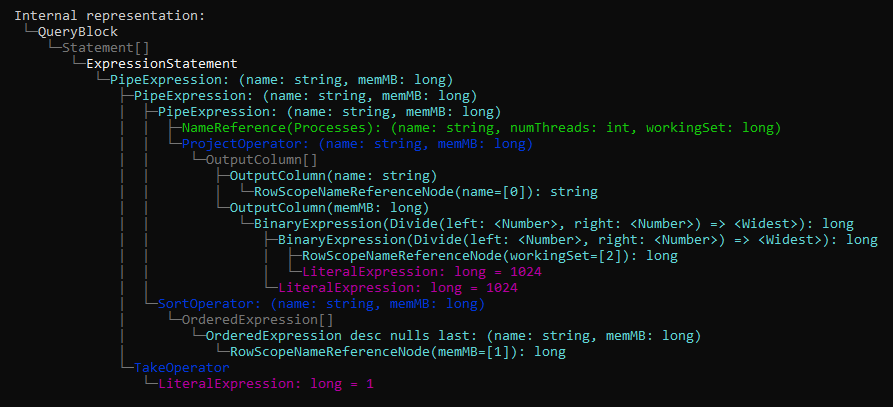BabyKusto is a self-contained execution engine for the Kusto Query Language (KQL).
-
Evaluate a simple query:
var query = "print hello='world'"; var engine = new BabyKustoEngine(); var result = engine.Evaluate(query);
-
Inject custom tabular sources:
Implement an
ITableSource, then register it with the engine usingBabyKustoEngine.AddGlobalTable(ITableSource table). You can think ofITableSourceas similar to anIEnumerable<T>, which allows the engine to get metadata about the table (e.g. its name and type) as well as to iterate over its data.Just like
IEnumerable<T>, the data doesn't have to be materialized ahead of time, and your implementation ofITableSourcecan produce data on the fly. The type, however, has to be static and known ahead of time.ITableSource myTable = /*...*/; // Get your data from anywhere var engine = new BabyKustoEngine(); engine.AddGlobalTable(myTable); var result = engine.Evaluate("MyTable | count");
-
Play with the samples
This repo ships with three ready-to-run samples that showcase BabyKusto in action.
-
Sample.HelloWorld: as simple as it gets, shows how to run a simple query.
-
Sample.ProcessesCli: a command-line tool that lets you explore processes running on your machine using KQL. For example, find the process using the most memory with a query like this:
Processes | project name, memMB=workingSet/1024/1024 | order by memMB desc | take 1 -
Sample.ProcessesServer: an ASP .NET Core-based web server that implements the Kusto REST API and exposes the same table
Processesas theSample.ProcessesClisample. You can connect to the local Kusto cluster using the official Kusto client (Azure Data Explorer).
-
BabyKusto leverages the official Microsoft.Azure.Kusto.Language package for parsing and semantic analysis of KQL queries.
The syntax tree is then translated to BabyKusto's internal representation (see InternalRepresentation), which is evaluated by BabyKustoEvaluator.cs.
You can explore the internal representation of a query by setting dumpIRTree: true when calling BabyKustoEngine.Evaluate.
Below is an example of the internal representation for the query:
Processes
| project name, memMB=workingSet/1024/1024
| order by memMB desc
| take 1
This project welcomes contributions and suggestions. Most contributions require you to agree to a Contributor License Agreement (CLA) declaring that you have the right to, and actually do, grant us the rights to use your contribution. For details, visit https://cla.opensource.microsoft.com.
When you submit a pull request, a CLA bot will automatically determine whether you need to provide a CLA and decorate the PR appropriately (e.g., status check, comment). Simply follow the instructions provided by the bot. You will only need to do this once across all repos using our CLA.
This project has adopted the Microsoft Open Source Code of Conduct. For more information see the Code of Conduct FAQ or contact opencode@microsoft.com with any additional questions or comments.
This project may contain trademarks or logos for projects, products, or services. Authorized use of Microsoft trademarks or logos is subject to and must follow Microsoft's Trademark & Brand Guidelines. Use of Microsoft trademarks or logos in modified versions of this project must not cause confusion or imply Microsoft sponsorship. Any use of third-party trademarks or logos are subject to those third-party's policies.


